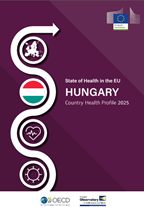HSPM
Health Systems and Policy Monitor

The Hungarian health system is highly centralised, with the national government assuming an increasing role both in financing and service delivery. In 2022, health system governance was shifted from the Ministry of Human Capacities to the Ministry of the Interior.
Hungary has a statutory health insurance (SHI) system with a single health insurance fund. This fund, administered by The National Institute of Health Insurance Fund Management (NEAK), provides almost universal and comprehensive coverage to the population, but there are user charges in certain service areas.
The health system is financed through payroll taxes from employers, social health insurance contributions from employees, and direct government transfers from general domestic revenues and earmarked (sin) taxes. While the share of public funding for health has been steadily growing over the past years, there is still a heavy reliance on out-of-pocket (OOP) payments. Outpatient medical care, pharmaceuticals, medical devices, and dental care are the main drivers of OOP spending.
The provision of secondary and tertiary care is mostly public, delivered by the central government, with some involvement of municipalities in the outpatient specialist care sector and a small but increasing role for private providers. Municipalities are responsible for organising primary care, where general practitioner (GP) services are predominantly provided by individual private practices. Primary care is currently being transformed as part of a larger restructuring of the Hungarian health system. Three main aspects are encouraging the formation of group practices, reorganising the emergency out-of-hours services and redrawing the borders of general practice (GP) districts. Public pharmacies are privately owned, with pharmacists having a legally required majority share.
Subscribe to our newsletter
Sign Up